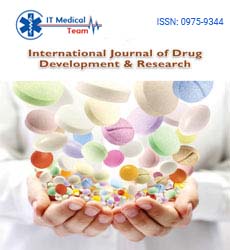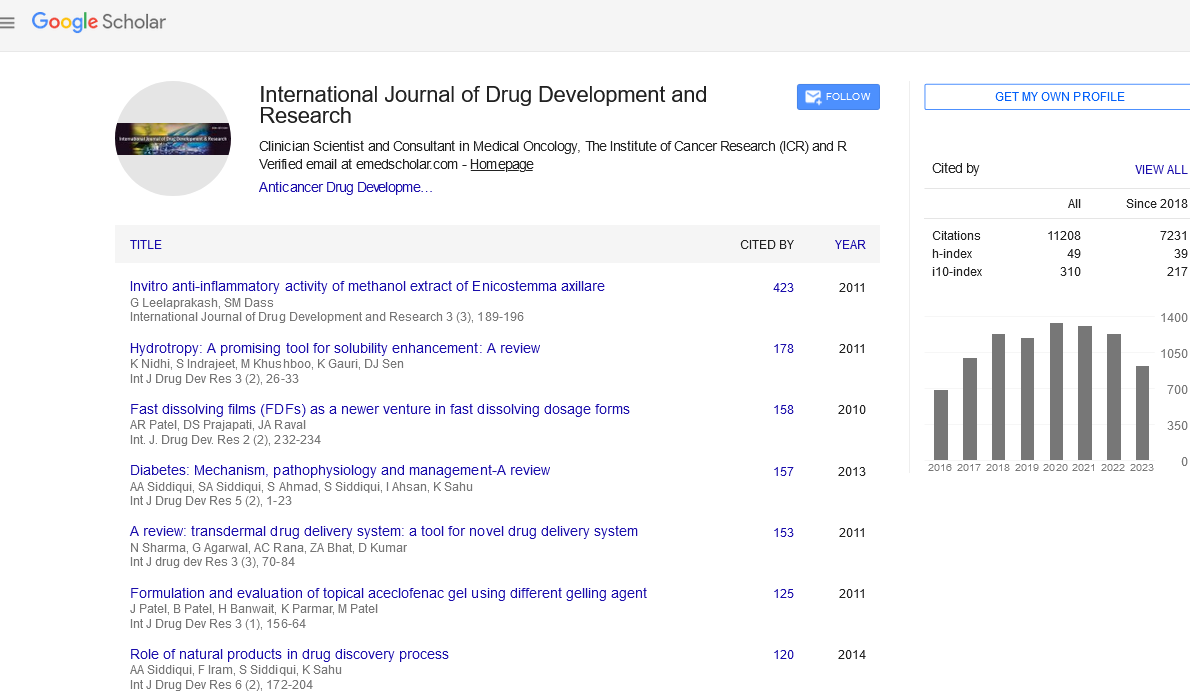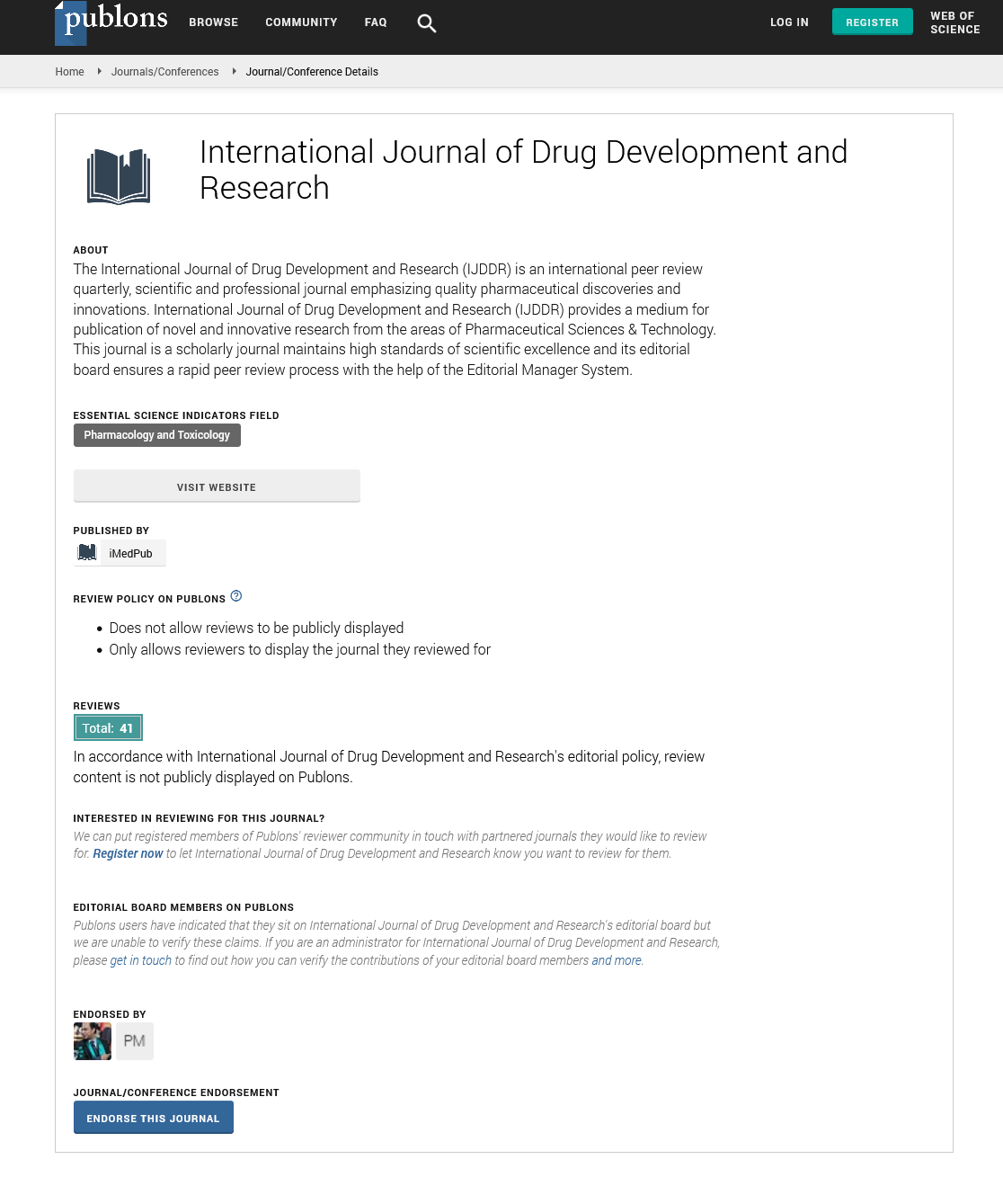Opinion - (2023) Volume 15, Issue 6
The emerging role of nutraceuticals: Powerful tools for disease management in the human body
Chying Cen*
Department of Nutraceuticals, Hebei Medical University, Shijiazhuang, China
*Correspondence:
Chying Cen, Department of Nutraceuticals, Hebei Medical University, Shijiazhuang,
China,
Email:
Received: 03-Nov-2023, Manuscript No. ijddr-23-14315;
Editor assigned: 06-Nov-2023, Pre QC No. P-14315;
Reviewed: 20-Nov-2023, QC No. Q-14315;
Revised: 27-Nov-2023, Manuscript No. R-14315;
Published:
07-Dec-2023
Introduction
In recent years, there has been a growing interest in the
use of nutraceuticals as effective tools for managing
various diseases in the human body. Nutraceuticals, a term
derived from "nutrition" and "pharmaceutical," refer to
bioactive compounds found in food sources that provide
health benefits beyond basic nutrition. These compounds,
ranging from vitamins and minerals to plant extracts,
have demonstrated potential in preventing and managing
diseases. This article explores the role of nutraceuticals in
disease management, highlighting their diverse applications
and the scientific evidence supporting their efficacy.
Description
Cardiovascular health
One of the prominent areas where nutraceuticals have
shown promise is in cardiovascular health. Heart disease
remains a leading cause of mortality globally, and lifestyle
factors play a crucial role in its development. Omega-3
fatty acids, found in fatty fish and certain nuts, have
gained attention for their cardiovascular benefits. Studies
suggest that omega-3s can lower blood pressure, reduce
triglycerides, and decrease the risk of heart disease.
Additionally, antioxidants such as Coenzyme Q10
(CoQ10) and resveratrol, found in foods like spinach and
red grapes, exhibit cardio-protective effects by combating
oxidative stress and inflammation.
Immune system support
Nutraceuticals also play a vital role in supporting the immune
system, especially in the context of infectious diseases.
Vitamins and minerals like vitamin C, vitamin D, and zinc
are known to enhance immune function. Vitamin C acts
as an antioxidant, protecting immune cells from oxidative
damage, while vitamin D regulates immune responses and
aids in the production of antimicrobial peptides. Zinc,
found in nuts and seeds, contributes to the development
and function of immune cells. These nutraceuticals are
increasingly recognized for their potential in reducing the
severity and duration of respiratory infections.
Joint and bone health
Osteoarthritis and osteoporosis are common musculoskeletal
conditions that affect millions of people worldwide.
Nutraceuticals like glucosamine and chondroitin sulfate, often derived from shellfish, have gained popularity for
their role in promoting joint health. These compounds are
believed to support cartilage repair and reduce inflammation
in joints. Furthermore, calcium and vitamin D, obtained
from dairy products and exposure to sunlight, are essential
for maintaining strong and healthy bones. Incorporating
these nutraceuticals into one's diet may contribute to the
prevention and management of bone related disorders.
Cognitive function
As the global population ages, cognitive health becomes
an increasingly significant concern. Nutraceuticals have
emerged as potential allies in the battle against cognitive
decline and neurodegenerative diseases like Alzheimer's.
Omega-3 fatty acids, particularly Docosahexaenoic Acid
(DHA), found in abundance in fish oil, are essential for
brain health and may help protect against cognitive decline.
Additionally, antioxidants like flavonoids, present in
berries and dark chocolate, exhibit neuroprotective effects
by reducing oxidative stress and inflammation in the brain.
Metabolic health and weight management
The global rise in obesity and metabolic disorders has
prompted research into nutraceuticals that can support
weight management and metabolic health. Green tea
extract, containing catechins, has been studied for
its potential to enhance fat oxidation and improve
insulin sensitivity. Another noteworthy nutraceutical is
chromium, found in broccoli and whole grains, which may
help regulate blood sugar levels. Additionally, fiber-rich
nutraceuticals like glucomannan, derived from the konjac
plant, have been associated with satiety and reduced calorie
intake, contributing to weight management.
Antioxidant properties
One common thread among many nutraceuticals is their
antioxidant properties. Antioxidants neutralize harmful
free radicals in the body, which are implicated in various
diseases, including cancer. Polyphenols, present in fruits,
vegetables, and green tea, have potent antioxidant effects.
Curcumin, derived from turmeric, has demonstrated
anti-inflammatory and antioxidant properties, making it
a subject of interest in cancer prevention research. While
nutraceuticals should not replace conventional cancer
treatments, their potential role in supporting overall health
and well-being is increasingly recognized.
Challenges and considerations
While the potential benefits of nutraceuticals are promising, it
is essential to approach their use with caution. Nutraceuticals
are not regulated as strictly as pharmaceuticals, leading to
variations in product quality and efficacy. Additionally,
individual responses to nutraceuticals can vary, and their
effectiveness may depend on factors such as genetics, diet,
and overall health. Consulting with healthcare professionals
before incorporating nutraceuticals into one's routine is
crucial to ensure their safe and effective use.
Conclusion
Nutraceuticals are emerging as powerful tools for disease
management in the human body, offering a holistic and
preventive approach to health. From cardiovascular support
to immune system enhancement, joint and bone health,
cognitive function, metabolic health, and antioxidant
properties, nutraceuticals demonstrate diverse applications
backed by scientific research. As we continue to unravel
the potential of these bioactive compounds, it is essential
to strike a balance between harnessing their benefits and
addressing the challenges associated with their use. With
ongoing research and a commitment to evidence based
practices, nutraceuticals have the potential to revolutionize
disease management and contribute to a healthier and
more resilient global population.






